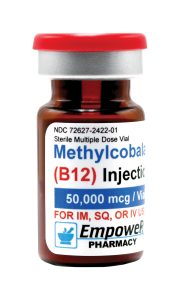
General Information: Methylcobalamin, or vitamin B12, is a B-vitamin. It is found in a variety of foods such as fish, shellfish, meats, and dairy products. Although methylcobalamin and vitamin B12 are terms used interchangeably, vitamin B12 is also available as hydroxocobalamin, a less commonly prescribed drug product (see Hydroxocobalamin monograph), and methylcobalamin. Methylcobalamin is used to treat pernicious anemia and vitamin B12 deficiency, as well as to determine vitamin B12 absorption in the Schilling test. Vitamin B12 is an essential vitamin found in the foods such as meat, eggs, and dairy products. Deficiency in healthy individuals is rare; the elderly, strict vegetarians (i.e., vegan), and patients with malabsorption problems are more likely to become deficient. If vitamin B12 deficiency is not treated with a vitamin B12 supplement, then anemia, intestinal problems, and irreversible nerve damage may occur.
Mechanism of Action: Vitamin B12 is used in the body in two forms, methylcobalamin and 5-deoxyadenosyl cobalamin. The enzyme methionine synthase needs methylcobalamin as a cofactor. This enzyme is involved in the conversion of the amino acid homocysteine into methionine which is, in turn, required for DNA methylation. The other form, 5-deoxyadenosylcobalamin, is a cofactor needed by the enzyme that converts L-methylmalonyl-CoA to succinyl-CoA. This conversion is an important step in the extraction of energy from proteins and fats. Furthermore, succinyl CoA is necessary for the production of hemoglobin, the substance that carries oxygen in red blood cells.
Contraindications/Precautions: Who should not take this medication? Patients with early hereditary optic nerve atrophy, cyanocobalmin hypersensitivity, and those who are pregnant. Your health care provider needs to know if you have any of these conditions: kidney disease; Leber’s disease; megaloblastic anemia; an unusual or allergic reaction to methylcobalamin, cobalt, other medicines, foods, dyes, or preservatives; pregnant or trying to get pregnant; breast-feeding.


